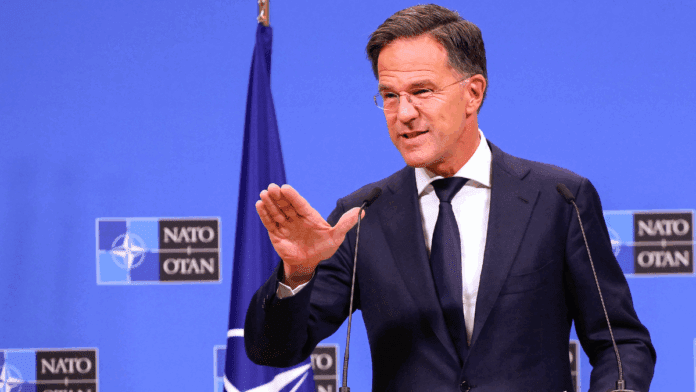NATO Secretary General Mark Rutte has issued a strong warning to countries that continue doing business with Russia. Speaking at the U.S. Capitol on Wednesday, Rutte said that nations like Brazil, India, and China could face powerful secondary sanctions if they do not reconsider their economic ties with Moscow.
Rutte’s statement came a day after President Donald Trump threatened 100% tariffs on buyers of Russian exports unless a peace deal is reached within 50 days. Rutte urged the leaders of these countries to act quickly. He said they should directly pressure Russian President Vladimir Putin to get serious about peace talks.
“My encouragement to these three countries, particularly is, if you live now in Beijing, or in Delhi, or you are the president of Brazil, you might want to take a look into this, because this might hit you very hard,” Rutte told reporters.
He added, “So please make the phone call to Vladimir Putin and tell him that he has to get serious about peace talks, because otherwise this will slam back on Brazil, on India and on China in a massive way.”
These remarks came after Rutte’s meeting with President Trump in Washington on Monday. The NATO chief confirmed that Europe and the U.S. are now aligned on taking tougher actions to isolate Russia economically and support Ukraine militarily.
???? NATO ramps up weapons flow to Ukraine as Trump warns Russia — Kremlin says it’s not afraid
President Trump’s 100% Tariff Threat and New Weapons for Ukraine
President Donald Trump on Tuesday announced a major step in U.S. support for Ukraine. He confirmed that the United States would now begin sending a large number of new weapons to the country. This includes air defense systems, missiles, and ammunition—all paid for by European allies, according to Rutte.
This new supply package is designed to help Ukraine strengthen its position during potential peace negotiations. But the announcement also came with a sharp warning. President Trump threatened to impose 100% secondary tariffs on any country that continues buying goods from Russia if no peace deal is reached in the next 50 days.
These secondary tariffs would not target Russia directly but would punish countries that help keep its economy alive through trade. This puts countries like Brazil, India, and China at serious risk of economic consequences.
Rutte, speaking alongside U.S. officials, made it clear that time is short. The countdown has begun, and the message to world leaders is urgent: supporting Russia could become very costly.
U.S. Lawmakers Voice Concerns Over the 50-Day Window
While the actions by President Trump were praised by some, there is concern in the U.S. Congress about the 50-day timeline. Republican Senator Thom Tillis said he worries that Russia might use the delay to its advantage.
???? EU retreats—for now: €21B tariff blitz paused as Trump threatens Europe with economic war
He said, “Putin would try to use the 50 days to win the war, or to be better positioned to negotiate a peace agreement after having murdered and potentially collected more ground as a basis for negotiation.”
Tillis emphasized that any new gains made by Russia during this period should not be recognized or accepted during peace talks. The goal, according to him, is to ensure that delaying diplomacy doesn’t benefit Moscow.
In response, Rutte promised that European countries would secure the necessary funds to help Ukraine stay strong. He said they are working closely with President Trump and military officials to deliver maximum support.
When asked whether long-range missiles were being considered, Rutte confirmed that both defensive and offensive weapons are in discussion. While he didn’t reveal specific details, he noted that the final decisions would be made by the Pentagon, the Supreme Allied Commander in Europe, and the Ukrainian military.
This united move by NATO and the U.S. marks a clear shift toward pressuring Russia harder—while also warning others who continue to trade with Moscow that they could be next in line for serious penalties.


